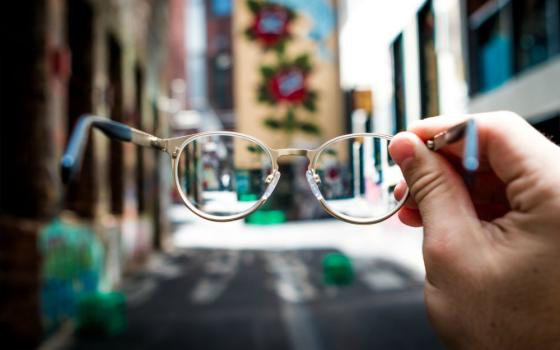The nightly news offers one tragic story after another. What effect does a steady diet of woeful stories about things like gun violence, people's indiscretions, and hatred toward one another have on our ability to maintain a positive attitude in life?
I have acquaintances who simply don't turn on the TV or radio news anymore. Local and national news is the same to them: a parade of tidbits one can do without. "I can't stand all that negativity," a friend freely shares.
"And what a mistake it was the other evening to watch a televised candidate forum. I was thinking that the candidates would focus on the issues and convince us why they deserved votes. But that wasn't what happened. Both candidates reduced each other to nastiness and just kept pointing out what the other didn't do enough of or did too much of in his political career. What a waste of time!"
We're all familiar with the phrase, "Love is blind." To most of us, this likely relates to how two people in love lose their ability to think critically. Me, I take the words literally. How is love blind?
The orchestra in which I play had a social gathering recently. I was sitting in a conversation group with our blind flautist, Regina. When she asked me to guide her to the restroom, she lightly tucked her hand under my arm, and we walked there together. I stayed slightly ahead of her so I could alert her to changes in walking surface, but she stayed right with me. I opened the door to the restroom and said, "Let me turn on the light for you." Then we both burst out in laughter at the idiocy of that statement. Of course she didn't need the light on.
Regina is such a remarkable lady. Her husband is also blind, yet they've forged a fulfilling life together. Their children — raised by parents who could never see them or see what they were doing — are lovely young adults today. I think about how challenging that would be for the parents and children alike. I think of my own parents, with six children and a dog. We all could see each other clearly and never hesitated to clamor for constant attention. Our parents employed a nice combination of involvement and giving us freedom to sprout our wings. But we knew they could see us and they paid attention to what we were doing.
How in the world did Regina and her husband maintain a happy home if neither could see?
Regina has a master's degree and is a registered music therapist. She has a picture of her service dog in a graduation cap and gown, escorting her across the commencement stage; the dog accompanied her to every class session and earned the right to graduate with her.
How does a blind person play in an orchestra, you ask? Her music isn't written in Braille! Preparing for a new concert, Regina audiotapes the selections during the first few rehearsals, capturing the flute part played by the person next to her. She practices diligently and memorizes everything she plays. Her audio-learning method works, and it's not long before she's playing her part as well as the sighted flautists. She's even done solos for the section, her service dog lying faithfully under her chair.
Regina is so remarkable in her accomplishments, but she's oh-so-humble about everything. She knows our voices and carries on conversations incredibly well. She's a great cook, and her wit just doesn't stop. She and her husband are both retired now, and when asked what time she gets up in the morning she answers, "Five-stupid-thirty. That's been my husband's time to get up for years and he still sets the alarm for then. Five-stupid-thirty. I want to keep sleeping!"
But back to my original question of how love is blind. If I have no sight and can't behold you, would that provide a basis to love you?
If I can't see you, do I like you or dislike you? Do I dislike you enough to shoot you with a gun? But on what would that dislike be based? What if you're only a voice in the room because I can't see how you look, what you're wearing, how your hair is styled, if you're chubby or skinny, or the color of your skin? If I can't compare your appearance to mine thus can't apply my own standards and see how you measure up to "ideal me," then do I act more tolerant?
Maybe the world would be a nicer, kinder and less violent place if we looked at each other with a certain blindness. What if I could encounter you — someone with ideas, hopes, dreams and enthusiasm for life — and totally appreciate you without getting caught up in your appearance or shape or size or skin color?
When I taught junior high, I lived with other sisters who taught there. When the father of one of our students passed away, two of us decided to go to the funeral home on Sunday afternoon. Lunchtime on Sunday was an eat-up-the-leftovers-in-the-refrigerator time because the next cooking week began with Sunday evening dinner.
Sister Juni and I enjoyed some lunch before we went to the funeral home. She rummaged in the refrigerator and emerged with a cold pork chop, cold mashed potatoes, and cold pork dressing. "Aren't you going to heat that up?" I asked. Sister Juni shook her head no, responding that she liked it cold. I heated mine up. After lunch we took off for the funeral home.
The funeral home was a posh place; we told the doorman the name of the deceased, and he announced us as we entered, much as if we were royal ballroom guests. We expressed our condolences to the family, offered a prayer at the casket, signed the guestbook, took the remembrance card, and left. We were there maybe 20 minutes total.
Out in the parking lot, I noticed that Sister Juni had a white glob on her brown habit scapular. I asked her what that was; she looked down, proclaimed it was some sticky pork dressing from lunch, scraped it off her habit, ate it and proclaimed, "Mmm. Still good!"
I said, "You did not just do that! And you mean we were in that posh funeral home and you walked in there looking like that?" I was so embarrassed. Sister Juni said, "Yes, it looks like I did that, all right. But dead people can't see."
No, dead people can't see. It's those living people that we have to worry about. To be honest, I was annoyed with Sister Juni after that incident. Did those people who saw us think that those nuns weren't very neat? On the other hand, if I had never noticed the pork dressing on her habit, I wouldn't have been aggravated with her.
May I notice the good in others, and not their globs of sticky pork dressing. I hope others treat me the same.
[Nancy Linenkugel is a Sylvania Franciscan sister and chair of the department of Health Services Administration at Xavier University, Cincinnati.]

